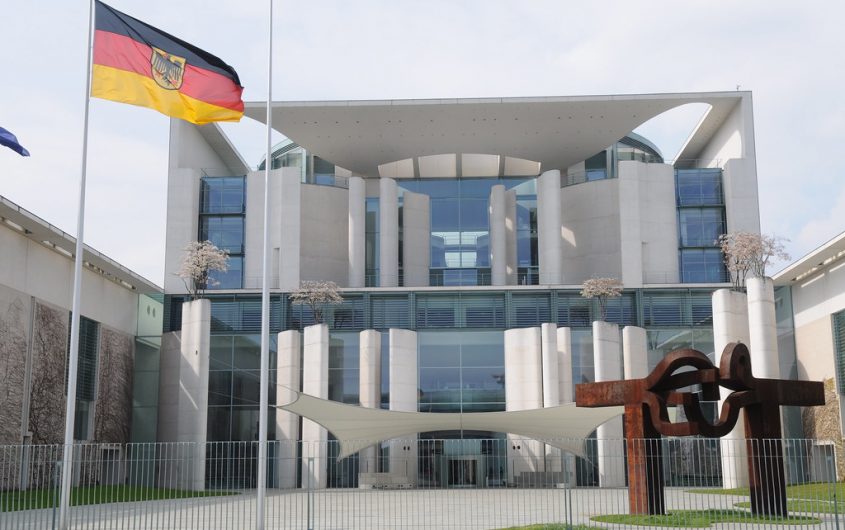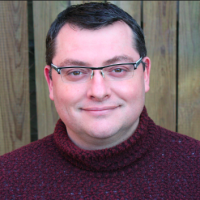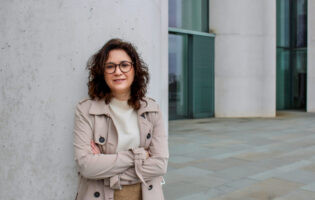
"startsocial - Preisträger" by PULS Deutschland
With the Chancellor Candidates Selected, the Election Campaign Heats Up

Eric Langenbacher
Senior Fellow; Director, Society, Culture & Politics Program
Dr. Eric Langenbacher is a Senior Fellow and Director of the Society, Culture & Politics Program at AICGS.
Dr. Langenbacher studied in Canada before completing his PhD in Georgetown University’s Government Department in 2002. His research interests include collective memory, political culture, and electoral politics in Germany and Europe. Recent publications include the edited volumes Twilight of the Merkel Era: Power and Politics in Germany after the 2017 Bundestag Election (2019), The Merkel Republic: The 2013 Bundestag Election and its Consequences (2015), Dynamics of Memory and Identity in Contemporary Europe (co-edited with Ruth Wittlinger and Bill Niven, 2013), Power and the Past: Collective Memory and International Relations (co-edited with Yossi Shain, 2010), and From the Bonn to the Berlin Republic: Germany at the Twentieth Anniversary of Unification (co-edited with Jeffrey J. Anderson, 2010). With David Conradt, he is also the author of The German Polity, 10th and 11th edition (2013, 2017).
Dr. Langenbacher remains affiliated with Georgetown University as Teaching Professor and Director of the Honors Program in the Department of Government. He has also taught at George Washington University, Washington College, The University of Navarre, and the Universidad Nacional de General San Martin in Buenos Aires, Argentina, and has given talks across the world. He was selected Faculty Member of the Year by the School of Foreign Service in 2009 and was awarded a Fulbright grant in 1999-2000 and the Hopper Memorial Fellowship at Georgetown in 2000-2001. Since 2005, he has also been Managing Editor of German Politics and Society, which is housed in Georgetown’s BMW Center for German and European Studies. Dr. Langenbacher has also planned and run dozens of short programs for groups from abroad, as well as for the U.S. Departments of State and Defense on a variety of topics pertaining to American and comparative politics, business, culture, and public policy.
__
Postwar German politics has been characterized by long periods of stability associated with dominant chancellors (Adenauer, Kohl, Merkel, Brandt/Schmidt) followed by a shorter period of upheaval and transition (Erhard/Kiesinger, Schröder), and then renewed stability. With the end of Angela Merkel’s sixteen years in power looming, the country appears to be entering another period of upheaval and realignment.
The campaign for the Bundestag election in September is already turning out to be the most interesting and dramatic since 2005—in direct contrast to the boring, demobilizing campaigns of the Merkel era. Polling has shown a volatile electorate with big swings in support, especially for the ruling CDU/CSU. Weeks of internal drama in the CDU accompanied the party’s selection of its chancellor candidate, culminating earlier this week in the selection of party chair Armin Laschet over the more popular Bavarian minister-president Markus Söder. The Greens this week also made their choice—Annalena Baerbock, beating out her (also more popular) party co-chair Robert Habeck. It is a near certainty that one of these two politicians will be the next chancellor.
True, last summer the SPD chose current finance minister Olaf Scholz as its candidate. But given that party’s lackluster polling—not even at 18 percent—there is little chance that the SPD will lead the next coalition. Even if a red-red-green or “traffic light” (red-green-yellow (FDP)) coalition emerges, it is highly unlikely that the SPD will be the strongest party. Still, the possibility remains. In several electoral cycles, notably the 2013 election, the Greens rode high in the polls a year or two before and then collapsed on election day. This could happen again, although this is much less likely this time around because the party is keenly aware of this history, has tried to address previous weaknesses, and has a much more disciplined party led by more pragmatic centrists.
Laschet pushed back on the unrelenting pressure to cede the chancellor candidacy to Söder and gained grudging respect for his resilience, ability to maneuver, and deal-making.
So, who are Laschet and Baerbock? Laschet, sixty years old, is the incumbent minister-president of the most populous federal state North Rhine-Westphalia (NRW). He has generated some criticism over decisions made to fight the pandemic. In fact, support for him and the CDU in NRW has tanked over the course of 2021—currently, his approval is only 26 percent (versus 69 percent disapproving of his performance) and his party is at 28 percent, only 2 percent ahead of the Greens. He is as centrist as it gets—having supported Merkel’s migration policies, being pro-business but not averse to the Energiewende and European-wide debt, for instance. He is considered jovial, but not particularly inspiring. That said, he pushed back on the unrelenting pressure to cede the chancellor candidacy to Söder and gained grudging respect for his resilience, ability to maneuver, and deal-making.
He does not have a particularly sharp profile in foreign policy. It is widely thought that he will support all foreign policy traditions but may be even more of a pragmatist on Russia and China than Merkel. He has supported Nordstream 2, for example, and warned against overly harsh sanctions on Russia in 2014. One possible departure from Merkel might be a more Francophile, federalist policy towards the European Union, expressing support for many of Emanuel Macron’s proposals. It has been pointed out that he is a devout Catholic from the border town of Aachen.
Baerbock’s rise in the Green Party has been nothing short of meteoric.
Baerbock presents quite a contrast. At forty years old, she is the youngest chancellor candidate in German history. To press this point, she was only eight years old when the Berlin Wall fell and nine when the country reunified. She is one of the first prominent politicians to be an almost complete product of reunified Germany, meaning also that she has much less of the baggage of the years of division. Born in Lower Saxony’s capital Hanover, she grew up on a farm just outside of that city and was a competitive trampolinist in her youth (even winning several bronze medals in the German championship). She did an exchange year in Florida in the mid-1990s and studied at the University of Hamburg and the London School of Economics in the UK, receiving a Master in International Law in 2005. Interestingly, she resides in Potsdam, which she represents in the Bundestag, the capital of the state of Brandenburg and formerly in East Germany.
Her rise in the Green Party has been nothing short of meteoric. Just three years after joining the party, she became the speaker for the working group on Europe in 2008 and the co-chair of the Brandenburg Greens in 2009. She was elected to the Bundestag in 2013 and was made the party’s climate politics speaker. She was elected co-chair of the national party in 2018 and chancellor candidate in April 2021. Her policy positions align with the pragmatic “realo” faction. She supports ending coal power by 2030 and speed limits on the Autobahn. Her party wants to cut emissions by 70 percent by 2030 compared to the 1990 baseline. A committed European, she supports strengthening the Union in a variety of areas such as refugee and migration policy. She is also a strong proponent of the new Green emphasis on reforming the economy along environmental lines as the way forward for continued prosperity in the twenty-first century.
A little surprisingly, she seems to have a stronger foreign policy profile than Laschet. She and her party support all traditions, especially the EU and even (a little controversially within the party) NATO—but perhaps not the 2 percent spending goal. She is much more critical of human rights abuses in Russia and China, so a government led by her would likely have quite different policy stances. She has been critical of Nordstream 2, for instance. Finally, she is as staunchly federalist as Laschet on EU issues, although she is perhaps not quite as enamored with Macron’s visions.
As external observers, we finally have a campaign to look forward to…, and the election itself is hugely consequential.
The stage is thus set for the September election. Much could happen in the next five months and the political ramifications of the pandemic are difficult to predict. Still, as many have proclaimed, German voters have a real choice this time around: experience versus new ideas; continuity versus dynamism; age versus youth. In addition to their attributes, each candidate has her/his challenges. Baerbock (unlike Habeck) has no government experience and has only been an elected member of parliament for eight years. Some voters might still think that the Green policy agenda is a recipe for energy cost increases, fewer jobs, and a European transfer Union. The Greens also have to avoid a collapse in support by election day. Laschet needs to overcome his reputation as an uninspiring leader representing too much continuity with the past and some vague if not problematic foreign policy stances. He will also need to mend fences within the Union parties and their voters—the struggle with Söder has left deep divisions, and we should not forget that he was only (barely) elected CDU chair in January. Finally, his pandemic governance will be closely scrutinized and could be a liability if judged harshly.
In any case, as external observers, we finally have a campaign to look forward to, which most certainly will not resemble a city council race in Würzburg—as the last few federal elections were memorably described. The election itself is hugely consequential. How splintered will the parliament be? What coalition options will be possible? Will we see a Chancellor Baerbock or Chancellor Laschet? How transformative and costly will the greening of the economy be? Will there be any departures in foreign policy? And will the next government be an unstable, transitional one, paving the way for another long period of dominance, or will more instability and changes in government be the new normal?









